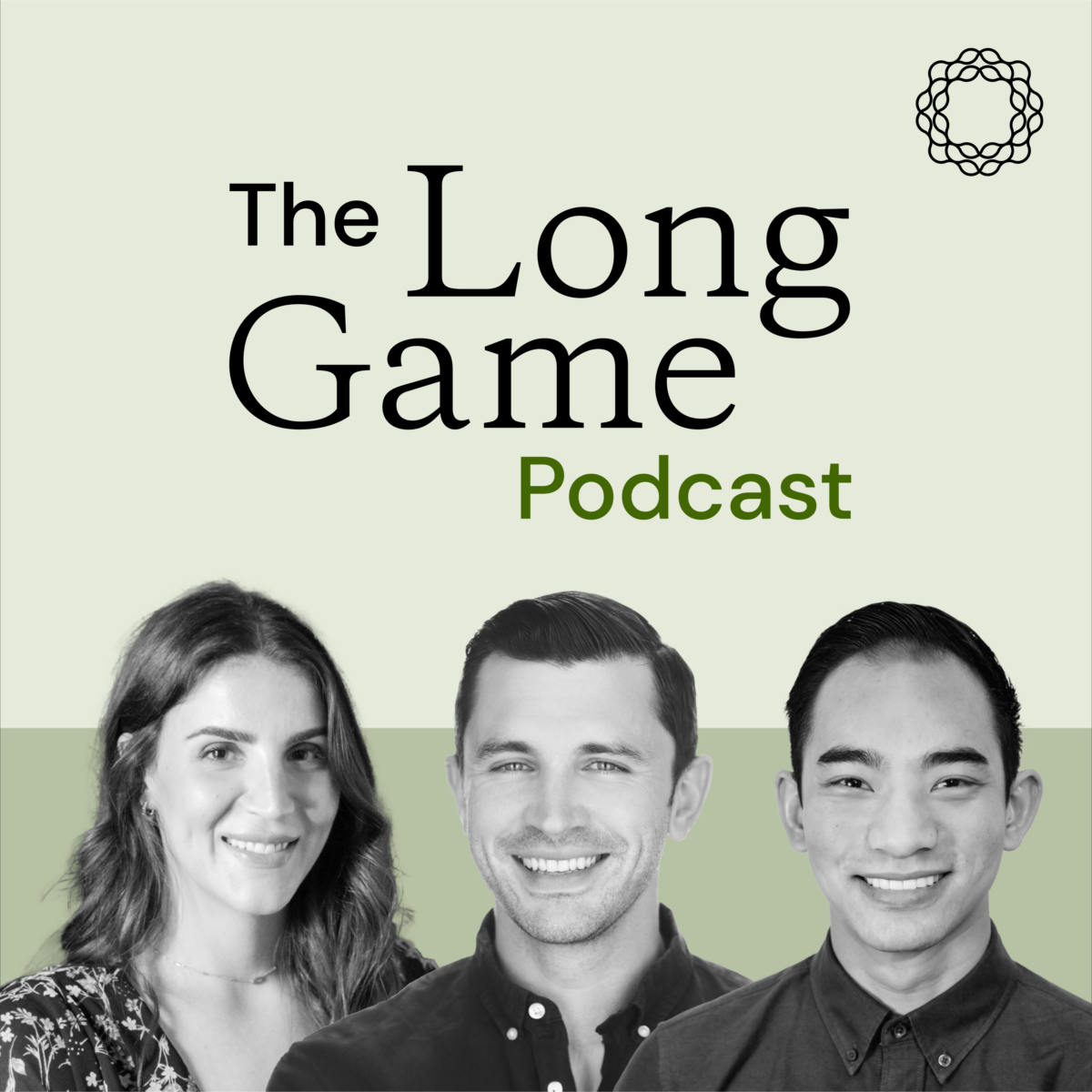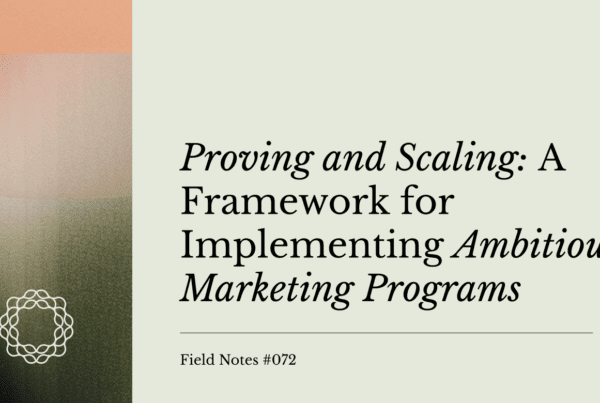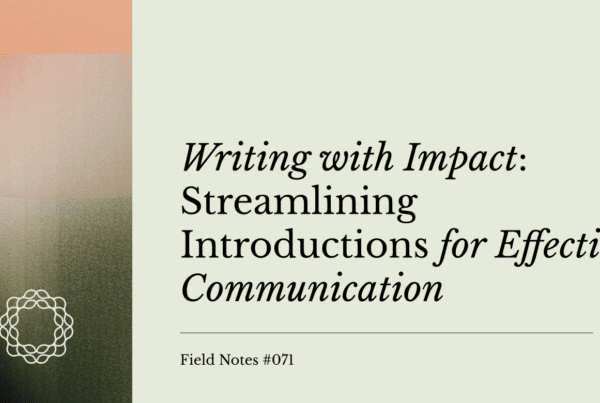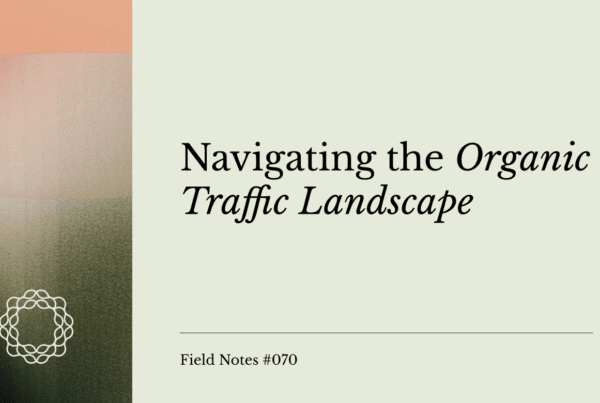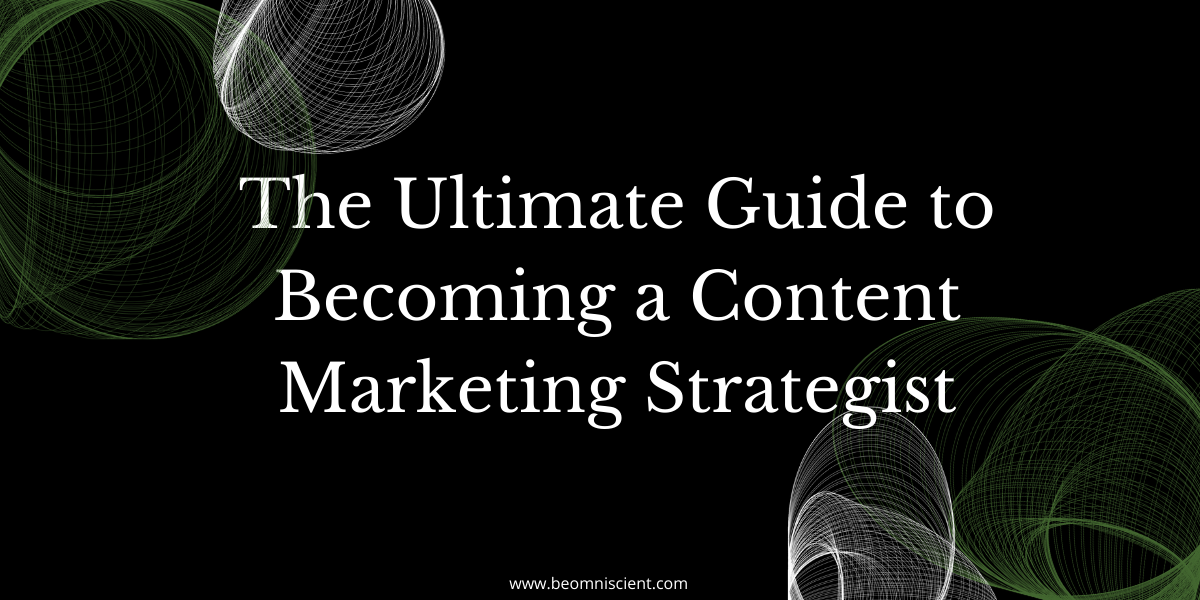
It’s rare to see a company nowadays that doesn’t do content marketing.
However, it’s almost always the case that a company’s content strategy could use some work.
Who does that strategy work? Well, a content marketing strategist of course!
In this piece, we break down the role of a content marketing strategist. Whether you want to hire one or you want to be one, this post will give you the answers you need to the most pressing questions:
- What does a Content Marketing Strategist do?
- What are some of the skills or traits an employer looks for in a Content Marketing Strategist?
- What does a typical year, quarter, month, week and day look like for a Content Marketing Strategist?
- What are some of the biggest misconceptions about the role?
- What are the biggest mistakes Content Marketing Strategists make in their work or strategy today?
- What’s the median salary for a CMS today?
- Why is the role of Content Marketing Strategist worth diving into in 2021?
- What does the future of content marketing look like?
And so much more.
To help answer these important questions, I asked Allie and Alex at Omniscient Digital to give us their unique perspective. You can watch the video interview here, or listen to the podcast.
I also include answers in this guide from other experts in the content marketing space. They include:
- Tracey Wallace, who has run content strategy at companies like BigCommerce, Eterneva, and now, MarketerHire.
- Derek Gleason, Content Lead at CXL.
- Jimmy Daly, CEO of SuperPath, formerly VP of Growth at Animalz
Let’s dive right in.

What does a Content Marketing Strategist do?
Content Marketing Strategists specialize in analyzing a business’s goals, and then developing promotional strategies using a wide variety of mediums to deliver a message, and meet the needs of the desired audience.
The responsibilities of a content marketing strategist can vary depending on the organization, but generally they:
- perform in-depth audits (such as content & backlink audits) of a company’s websites and social media accounts
- create a shared editorial calendar, manage overarching campaigns and budgets
- create, write, or curate content (sometimes, otherwise they act as an editor)
- analyze the results of the delivered content.
Allie Decker says, “I view content marketing on a spectrum. Taking content and understanding how it authentically promotes or communicates a product or a service is the middle of the spectrum. I believe farther down the spectrum is creating that strategy from scratch. So building the content roadmap reports, looking at your annual goals, looking at the products and services you have to sell, looking at your audience and understanding how we can create content that connects with those folks and promotes what we have to sell.”
We previously wrote about content calendars, which Alex Birkett describes a content calendar as the handshake between strategy and execution. With that said, he believes the content strategist role is the bridge between the marketing strategy and the business strategy, at a more granular level.
He adds, “The role of a content marketing strategist may encompass writing, editing and planning, but that function of the strategy seems to be mostly researching, organizing, and leading a team. A content marketing manager might have to do each one of these things, or there may just be one person that just simply does the strategy stuff, probably at larger companies. But I think it’s mainly the separation between the idea and the execution.”
Jimmy says in his experience, a Content Strategist usually isn’t creating that much content.
“I think that’s important to highlight right upfront because in my experience, as a content strategist, managing content strategists, hiring content strategists I’ve always been looking for individuals who have a proven track record of good writing, but who are also ready to take the next step in their career. So a content strategist has to be able to write but they also have to be able to edit. They have to know all the basics of SEO, promotion, email marketing, link building, and all the things that come along with being a good content manager.”
What are some skills or traits an employer will look for in a Content Marketing Strategist?
Allie says, “It’s definitely best to start as a writer and work your way up since you need those fundamental skills to begin with. But even if you’re not in a daily writing role you’re probably going to have to do some editing. You need to be a good communicator. You will mainly work on strategy and figuring out how content fits into the broader piece of the marketing puzzle.”
“Other skills I’ve had to master since becoming more of a strategist is understanding where SEO fits in. It’s another language to learn. Knowing how to plug in hyperlinks and CTAs where offers can fit in the pieces.”
After delivering content, another big part of the role is completing that life cycle by analyzing the results of how a particular piece performed.
Jimmy says, “A good strategist should also be fairly analytical. They should be very comfortable in spreadsheets. They should be able to take data from separate sources, combine it in a spreadsheet and be able to do analysis, so they understand exactly how their content is performing. They should understand how it’s affecting the business. They should understand what the business objectives are and have a very clear idea of whether or not the work that they’re doing or overseeing is helping the company achieve that.”
Alex adds, “You may have an analyst on your team that can help you with those data tables and how to find those insights, but what you do with those measurements informs the planning. The analytics are a facet of research itself. It feeds into the insights that you’re using to feed into the plan.”
Assembling a team of freelancers and managing workflow is another important aspect of the role.
Jimmy says, “Most of the content strategists that I’ve worked with have also managed people in some capacity. In some cases that’s like full on people management, running one-on-ones, doing reviews once a year, that kind of thing.”
In a list, here are some key traits and skills an employer will look for in a CMS, keeping in mind it will depend on the size of the organization. Sometimes the smaller the company, the more skills you will need to have.
- Audience persona building
- Keyword research
- Writing and/or editing
- Knowing how to set content goals
- Content ROI and knowing how to calculate it
- Managing budgets
- Client and relationship skills
- Leadership and managing a team
- Creative thinking
- Knowing how to quantitate results and measure success
- Vetting and hiring freelance writers
Related: The Complete Guide to Finding, Vetting, and Hiring Freelance Writers
What does a typical year, quarter, month, week and day look like for a CMS?
There are many different activities throughout the year that are critical to the role, as well as the overall success of the strategy and execution.
Annually
Usually you will see these annual activities happen around November/December to restructure in time for the new year.
This is the time for leadership alignment. You’ll get the company’s overarching revenue goals that will help you determine how much traffic you will need to drive from your content for conversions.
Here’s what typically happens on an annual basis:
- High-level goal planning
- SWOT analysis (company’s strengths, weaknesses, opportunities and threats)
- Competitive Marketing Analysis
- Determining main KPIs (Key Performance Indicators)
- Setting OKRs (Objectives and Key Results)
- Putting together annual budgets
- Establishing partnerships
- Setting up SLAs (Service Level Agreements), if you treat your teams within your companies as different agencies
- Deciding how you will collect analytics and metrics
- Establishing marketing personas
It’s important to note that establishing marketing personas isn’t always the responsibility of the CMS. There are times those will come from the product department who establish them, while the marketing department uses them for messaging, or to create a story.
Quarterly
Quarterly is where things get a bit more granular according to those larger, master plans. You’re figuring out quarter-by-quarter how the team will achieve those goals and what tasks will need to be accomplished.
Allie says, “Topic planning usually happens at the quarterly level. Whether it’s a big batch of keyword research or understanding what your pillars might be, and breaking down the specific clusters or, the individual topic pieces. I’ve seen quarterly sprints when the calendars are scheduled out. If you have a January, February, March sprint, then by March, the content strategists will take all the pieces written in and schedule them out for the following three months.”
It generally takes about 3-6 months to really understand a content’s performance, so when you are updating content for SEO or for quality, maybe adding links or CTAs, this is best done at the quarterly level. This also goes for a re-release for distribution for new eyes.
Typically, this is the time for:
- Keyword research using tools like Ahrefs
- Topic planning
- content calendar
- Reviews
- Analytics
- Content updates or refreshes
Here’s a look at a sample content calendar in Google Sheets and then laid out in Asana. See our blog for more: How to Create a Content Calendar: Free Template




Monthly
On a monthly basis is where you will establish and execute more of the managerial tasks. This is also an ideal time for reviews and analytics. Understanding month-over-month numbers are key.
Allie also adds, “I would say from a management operation side, if writing pieces aren’t assigned quarterly, I think they should be assigned monthly for a writer. They should know what they have to tackle a month ahead. Weekly is the least amount of time you should give a writer. The assignments typically align with keyword research or the planning of the Content Roadmap Report (CRR).”
“A content strategist is almost always a manager and an editor, but I think those are distinct roles. The strategy hat is very specific stuff and that’s a lot of the yearly, quarterly stuff, and as you move towards monthly, weekly, and daily, it’s going to become a lot more editing, managing, and assigning.” – Alex
Monthly:
- Assign writing pieces
- Coordinate with design teams to illustrate articles
- Schedule social media posts
- Month-end reviews and analytics
Weekly
A weekly cadence can be helpful to shift the day-to-day operations as needed.
Allie says, “If you look at your week coming up and your five days of content that are on the schedule, but you have a guest post that came in, you can say I want to get this out on Wednesday and make that call on that Monday. I’d say those judgment calls come on a weekly basis.”
- Reviewing deliverables
- Product research
- External interviews
- Finalizing content schedules for the week
- One-on-one reviews
Kitchen Side Tip: Here at Omniscient Digital, for one-on-ones we use 15five which is a performance management tool. For project management we use Asana.
15five:


Project management tools allow you to plan and delegate work all in one place. You can organize by tasks, subtasks, workflows, boards and calendars. Here are some other popular tools:
Daily
There is a big delineation with weekly and daily tasks. It’s much more granular, and you are actively operating and executing. Whereas yearly and quarterly, your role is much heavier in the strategy, planning, and coordination.
Allie says, “I rewrite my to-do list daily. Even if it’s just repeating what’s on the page prior so I know that this day I have to ideally get it done. Sometimes they roll over. Things pop up every day, and meetings pop up. Sometimes as much as I want to write a piece, I can’t, or it’s not coming to me so I’ll just roll it over to the next days to do list.”
A lot of Content Marketing Strategists will either be writing or editing daily, if not both.
Allie stresses that as a writer it’s important to protect your time because you have many different responsibilities.
“In my role, I do some writing but now that I’m doing more managing, editing, and hiring, even editing and writing take different parts of my brain. I do use online tools like Bard or rephrase tools to quickly edit content where required. But, most of the time I do it manually as I feel it is easier for me. If I can just focus on one thing for a day, it won’t be mental heavy lifting because that affects my writing quality.”
“If you’re a strategist at a small company, and you’re responsible for picking up new content all the time, try to focus on one thing or the other. Protect your time and dedicate certain days to writing.”
- Team stand-ups to go over status updates and blockers
- Reviewing tasks
- Writing
- Editing or proofreading before publishing
How do you excel at the role and ship quality content?
According to Tracey at MarketerHire, “Excelling at content marketing, I believe, requires two things. The first is being the ability to stay within the guardrails of the brand guidelines. That is, you can respect and follow branding needs, and understand how to weave in a brand story and make the content you are writing tie back to brand pillars. The ability to do this, and do it well, is what has given rise to content marketing and expanded the job market for so many writers.”
Second, however, is the ability to balance those brand guidelines with true human need.”
Ask yourself these questions:
- Who are you really helping?
- Is the content you are writing serving the reader? That means, is the content educating or helping in some way beyond your brand?
- What has made content so popular, and why so many people have fallen in love with brands through their content?
“It’s also what makes some content marketers so much more effective. It isn’t about just writing and publishing for publishing’s sake. It’s about knowing your audience, what helps them, and making the internal case for the production of content that does justice by them, not solely the company.”
Tracey adds that good content does not:
- Waste people’s time. There is so much information on the web. Distraction is so easy and alluring.
- Offer baseless advice. Far too many articles are written by those who have little to no experience in the subject matter.
- Exist for the sake of existing: Good content should take time to create. SEO is important, but the human reading the content is more so.
Derek says, “The only reason content marketing works, the reason it’s a “thing”, is that it makes economic sense for businesses to support the production of information. Everything else about content marketing is a liability. You should only cover a subset of topics (presumably those most relevant to your company/product/service). You have to try to convince people to sign up or buy or whatever. You may have to omit information or spin something to put your company/product service in a positive light. You have to choose topics with high search volume to hit KPIs. So, I think people who excel at content marketing get that.”
He says a good CMS understands the following:
- How to choose topics for which your company can be impartial
- How to build distribution channels so that you’re not stuck writing only about things with keyword volume
- How to get C-Suite buy-in to let educational content really do the work, rather than badgering people into signing up for an email list.
- A good CMS also figures out the proper number of keywords to use in the content for SEO by doing in-depth keyword research and analysis. They aim to strike a balance between including relevant keywords naturally in the content and avoiding keyword stuffing.
“Beyond that, I’d say the other key component is going beyond the (very bad) metrics we have to judge content success. Social shares, links, and traffic are what most people look at when they’re doing content research of the most successful content on a topic or on other sites. Those metrics usually tell you a lot more about how powerful a website is than how good an individual piece of content actually is.”
“One hundred social shares for a BuzzFeed article is flop; 100 social shares for an article on my personal blog is a big win. If you’re just looking at raw numbers, though, you’d never know the difference.”
“And if you’re not capable or interested in digging a little deeper to see what kind of stuff really made a site (instead of just exploiting its audience), you’ll end up looking at the same numbers as everyone else, drawing the same conclusions as everyone else, and creating the same content as everyone else.”
What’s the average salary for the role?
Jimmy says it’s a really good time to be in this field. “At SuperPath we recently did a content marketing salary survey and I asked everyone for their job title and looked for certain words within that title and calculated an average annual income based on that.
Anyone with strategist someone in their title and averaged out their salaries and it came out to $76k which is pretty solid. There is a clear progression that goes up from there.”
The skills they develop make them suited to manage larger teams. Many heads and directors were formally strategists. There is quite a bit of upside for folks working as strategists right now.


Source: The 2021 Content Marketing Salary Report
According to salary.com, salaries can range widely depending on many factors which include education, certifications, the number of years in that profession and more.
One way to increase your salary over time is to go above what’s expected of you, and over-deliver value to the company. Delivering great results and tracking performance will be essential when you go in to negotiate a salary adjustment or raise.
Make sure to not only highlight your success thus far, but also be forward-thinking as well. How do you plan to deliver bigger and better results this quarter, next quarter? What value will you bring over the next year?
Why is the role worth diving into in 2021 and will there be a lot of opportunity?
The market is always evolving and rapidly changing. As Tracey says, content marketing relies heavily on distribution, and the channels which are large and not owned by individual brands. They are owned by Facebook, Google, TikTok, Linkedin, Slack, etc.
She says, “Email marketing is on the rise again, and I’m glad for it. Content marketers rely heavily on marketing counterparts to help distribute, and to ensure that their content gets in front of the right audiences. And of course, who those audiences are is changing – where they get their news, how they read it, etc. There will be a ton of demand for content marketing for a good while because of how much it is changing, and how deep of expertise is needed in the field.”
Derek says, “People have realized that a blog doesn’t make sense for everyone (or in my opinion, for just about anyone). Across the board, the quality of research, design, and writing is slowly increasing. That’s good news. Content marketing doesn’t survive unless the editorial standards mimic those of magazines, journals, encyclopedias, etc. The hard part is convincing a boss or client that it makes sense now to invest in creating something that’s better than what you need to create to earn shares, links, or a high organic ranking.”
Conclusion
Content marketing strategists are in demand — good ones, anyway.
How do you become a good content marketing strategist?
- You’ve got to love writing and creating content
- But you’ve also got to love creating the higher level strategy
- It doesn’t hurt to be a great manager
- You definitely have to coordinate many moving pieces and keep things organized
How do you hire a good content marketing strategist? Look for an ambitious person that has the above traits and experience.
Or, contact us. Our agency can effectively act as an interim content marketing strategist, building your roadmap and executing on it.



